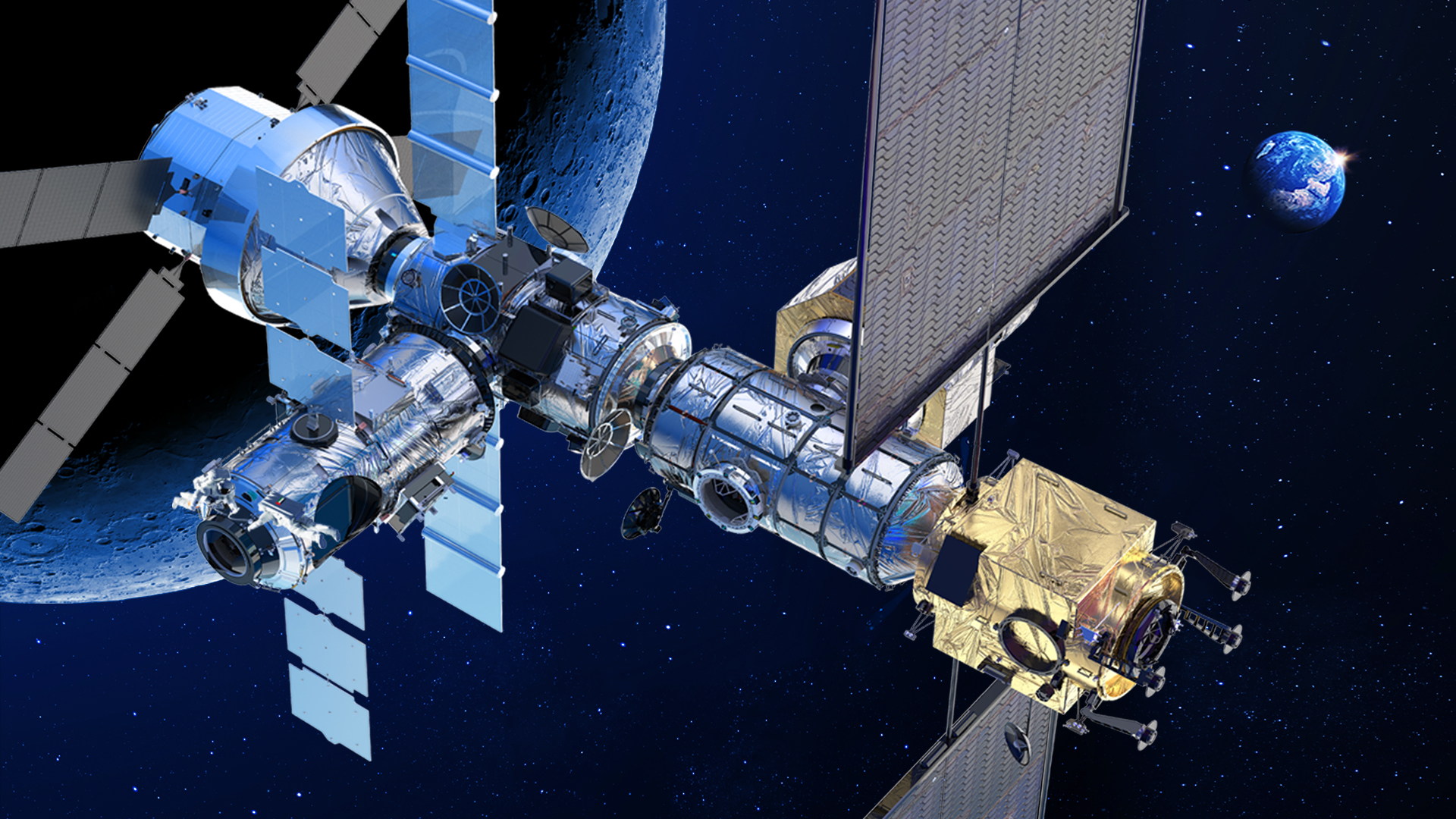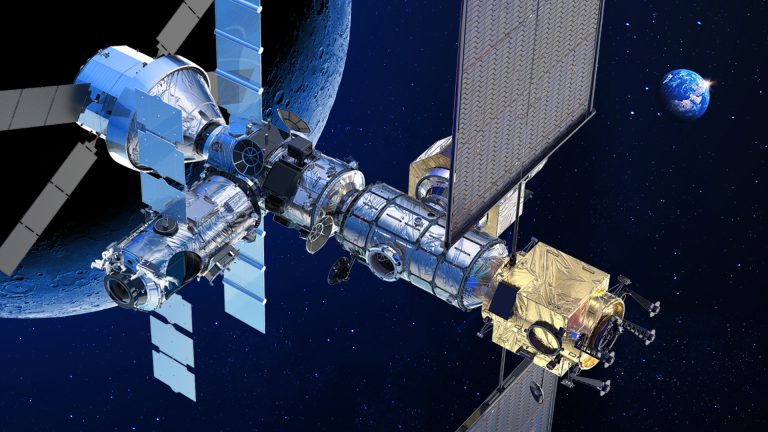Thales Alenia Space Wins Key Contract to Build Airlock for Lunar Gateway
Thales Alenia Space is instrumental in advancing lunar exploration through its significant contributions to the Lunar Gateway, including the construction of the Crew and Science Airlock Module and the ESPRIT module.
Summary
- Thales Alenia Space has been awarded a contract to build the Crew and Science Airlock Module for the Lunar Gateway, a collaborative project with the United Arab Emirates’ Mohammed Bin Rashid Space Centre (MBRSC).
- The airlock module is essential for facilitating extravehicular activities (EVAs), allowing astronauts to perform spacewalks and manage external scientific payloads.
- This partnership grants the UAE a seat on a future Artemis mission, enhancing its role in international space exploration.
- Thales Alenia Space is also developing the ESPRIT module, which will provide the Gateway with refueling capabilities and a 360-degree observation window.
- The Lunar Gateway is a key component of NASA’s Artemis program, aiming to establish a sustainable human presence on the Moon and serve as a staging point for future missions to Mars.
- The Crew and Science Airlock Module is scheduled to be delivered and integrated into the Gateway by the crewed Orion spacecraft on the Artemis VI mission, with completion expected in 2030.
- The ESPRIT module is planned for delivery in 2029 and will be launched on the Artemis V mission.
- Thales Alenia Space’s involvement in these projects underscores its leadership in space transportation systems, orbital infrastructures, and deep space exploration.
- The company’s contributions are pivotal in enabling extravehicular activities, providing essential infrastructure, and supporting international collaboration in lunar exploration.
- The Lunar Gateway will operate in a near-rectilinear halo orbit around the Moon, supporting missions to the lunar south polar region.
- The Gateway is designed to be a crew-tended facility, supporting up to four astronauts for missions lasting one to three months.
- The Crew and Science Airlock Module will also provide an additional docking port for visiting vehicles, enhancing the Gateway’s operational flexibility.
- The ESPRIT module will supply the station with xenon and chemical propellants to extend its operational lifetime.
- The observation windows in the ESPRIT module will offer astronauts unparalleled views of the Moon and space, enhancing scientific observation and crew well-being.
- Thales Alenia Space’s expertise and international partnerships are crucial in realizing the vision of a sustainable human presence on the Moon and paving the way for future deep space exploration.

Overview of the Lunar Gateway
The Lunar Gateway is envisioned as a crew-tended space station orbiting the Moon in a near-rectilinear halo orbit. Serving as a staging point for NASA’s Artemis missions, it will facilitate lunar surface explorations and potentially act as a stepping stone for future Mars missions. The Gateway’s modular design allows for international partnerships, with various countries contributing different elements to its construction.
The Airlock Module: A Critical Component
An airlock module is essential for any space station, providing a controlled environment for astronauts to transition between the pressurized habitat and the vacuum of space. For the Lunar Gateway, the airlock will enable extravehicular activities (EVAs), allowing astronauts to perform spacewalks for maintenance, scientific research, and other mission objectives. Additionally, it will serve as a docking port for visiting spacecraft, enhancing the Gateway’s operational flexibility.
UAE’s Contribution to the Gateway
In January 2024, the UAE announced its commitment to supply the airlock module for the Lunar Gateway. This decision was part of an agreement with NASA, wherein the UAE would provide the airlock in exchange for a seat on a future Artemis mission to the Gateway. The Mohammed Bin Rashid Space Centre (MBRSC), the UAE’s primary space agency, spearheaded this initiative, evaluating proposals from various international contractors before selecting Thales Alenia Space for the project.
Thales Alenia Space: A Trusted Partner
Thales Alenia Space, a joint venture between France’s Thales Group and Italy’s Leonardo, has a storied history in space infrastructure development. The company has been instrumental in constructing numerous modules for the International Space Station (ISS) and has been a key contributor to various international space exploration missions. Their selection by the UAE underscores their expertise and reliability in delivering complex space systems.
The Emirates Airlock Module
The Emirates Airlock Module, as it has been designated, will be designed to support a range of functions critical to the Gateway’s operations. Beyond facilitating EVAs, it will allow for the transfer of scientific experiments and equipment between the station’s interior and the external environment. This capability is vital for deploying instruments that need direct exposure to space and for retrieving them for analysis.
The module will also provide additional docking capabilities, accommodating visiting spacecraft and thereby enhancing the Gateway’s capacity to support diverse mission profiles. Its design will incorporate advanced life support systems, ensuring the safety and efficiency of astronaut operations during spacewalks.
Project Timeline and Future Prospects
The development of the Emirates Airlock Module is structured into several key phases: planning, design, qualification, flight preparation, and operations. In 2025, the project aims to complete the Mission Concept Review, followed by the System Requirements Review and the Preliminary Design Reviews at both the primary structure and system levels.
The module is slated for launch aboard the Artemis 6 mission, utilizing the Space Launch System (SLS) Block 1B rocket. This mission is currently scheduled for no earlier than 2030. Once integrated into the Gateway, the airlock will play a pivotal role in supporting sustained lunar exploration and potentially serving as a platform for future missions beyond the Moon.
International Collaboration and the Future of Space Exploration
The partnership between the UAE and Thales Alenia Space exemplifies the spirit of international collaboration that has become a hallmark of modern space exploration. By contributing a critical component to the Lunar Gateway, the UAE is positioning itself as a significant player in the global space community. Such collaborations not only pool resources and expertise but also foster a sense of shared purpose in humanity’s quest to explore the cosmos.
As space agencies and private companies around the world continue to push the boundaries of exploration, partnerships like this will be instrumental in overcoming the complex challenges of space travel. The development of the Emirates Airlock Module is a testament to what can be achieved when nations and organizations work together towards common goals.
References
- Thales Alenia Space signs a contract with Mohammed Bin Rashid Space Centre to develop the Emirates Airlock Module, a critical element of Lunar Gateway.
- Thales Alenia Space wins contract for Gateway airlock.
- Lunar Gateway.
- Thales Alenia Space.

